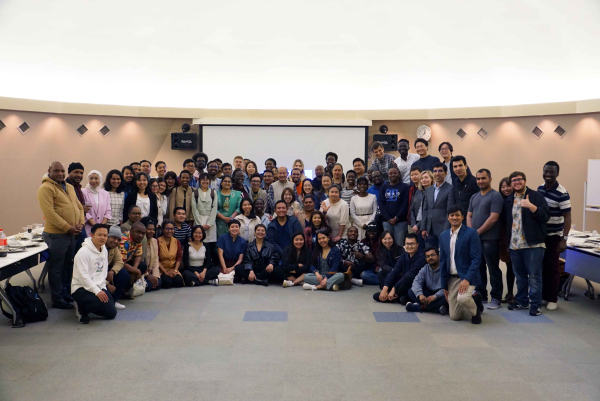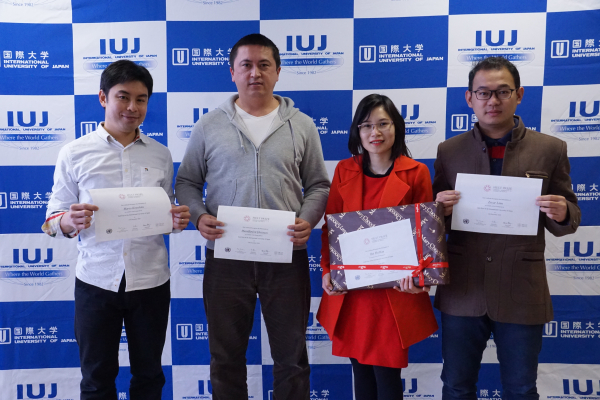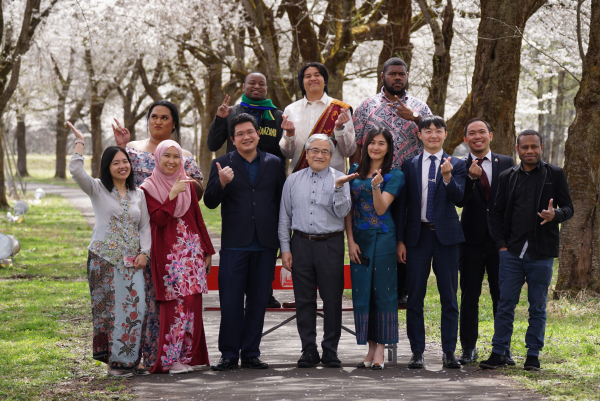일본 유학 정보 사이트JPSS > 니가타현의 대학원에서 유학지를 찾기 > 国際大学 > 国際関係学研究科
国際大学 유학을 생각하고 계시는 분들께 JAPAN STUDY SUPPORT는 재단법인 아시아학생문화협회와 주식회사 베네세코퍼레이션이 공동운영하고 있는 외국인 유학생을 위한 일본유학정보 사이트입니다. 国際大学 国際関係学研究科및Graduate School of International Management 등 연구과 별 상세 정보도 게재하고 있기 때문에, 国際大学 관한 유학정보를 찾고 계시는 분들은 꼭 이용해 보시기 바랍니다. 이 외에도 외국인 유학생을 모집을 하고 있는 1,300여 개의 대학・대학원・단기대학・전문학교의 정보도 게재하고 있습니다.
니가타현 / 사립
[Online Info Session] April 3rd, 5 PM - 5:30 PM JST
If you are considering your graduate study in Japan in 2025, please join us to learn about what IUJ has to offer and how to apply! Applications for September 2025 admission are open until April 21st for the international applicants residing outside of Japan.
Further details and pre-registration, please visit our website: https://www.iuj.ac.jp/info_2025aprmayjun/
One of the main features of the Graduate School of International Relations lies in its interdisciplinary and policy-oriented curriculum, covering fields such as politics, economics and management. The GSIR, which teaches students about the various experiences related to development in Japan and the Asia region, aims to cultivate specialists who can systematically analyze various international relations issues, including those stated above, from the viewpoint of different disciplines, while taking into consideration historical and cultural perspectives. The GSIR also aims to produce specialists with intellectual judgment and problem solving skills who have both a community-based global perspective and long-term vision of forecasting contemporary trends.
Graduate School of International Relations website: http://gsir.iuj.ac.jp/

Dean’s Hour

Hult Prize competition on campus

Beautiful nature
The IDP offers two 2-year MA degrees : International Development (ID) and Economics (ECO). Students are required to complete coursework (at least 40 credits) and write a thesis or research report using a quantitative approach.
The ID track offers various development-related courses in economics, regional science, and related fields. Throughout their studies, students learn how to evaluate current policies and design more effective ones to encourage economic growth and social development in developing countries. The ECO track emphasizes modern economic theories and their applications. Students learn applied macroeconomics, comprising fiscal policy and international finance, as well as empirical microeconomics including labor, health, and environmental issues to understand and analyze current issues. Both degree tracks aim to equip students with advanced knowledge and skills so that they will tackle and overcome the problems they are facing as new leaders in both the public and private sectors.
The ECO also offers the Macroeconomic-Policy Program (MPP), a special master's program established in cooperation with the IMF (International Monetary Fund). The MPP is designed to provide professionals from central banks, finance ministries, international organizations, and private financial institutions with academic training in the field of macroeconomics.
Lean more about the International Development Program: http://gsir.iuj.ac.jp/idp/
IR students, taking the core courses for the IR degree, acquire the basic concepts and theories of international relations, empirical
knowledge, and analytical skills. All of these are necessary to understand the diverse accepts of international relations. PS students take core courses for the PS degree, which cover PS topics such as comparative politics, political institutions, political theory, and methodology, with a strong focus on methodology. PS students thereby acquire sufficient methodological skills to analyze diverse issues in political science.
Additionally, the IRP offers various elective courses. IR degree students can choose courses to focus on particular thematic or regional
issues to analyze and understand dynamic, complex contemporary international affairs. Those courses seek to provide more advanced,
specific, and up-to-date studies corresponding with the multi-disciplinary nature of the international relations field. PS degree students can choose courses in international relations and international political economy, thereby further broadening their knowledge in political science.
In the end, IRP students are expected to develop the
Learn more about the International Relations Program: http://gsir.iuj.ac.jp/irp/
The PMPP offers two-year master's degrees: MA in Public Management (PM) and MA in Public Policy (PP). Students are required to complete coursework and write either a thesis or research report that can be chosen from
a wide range of managerial or policy issues.
The PMPP provides students with the knowledge and skills that are necessary to be good managers in public and non-profit organizations.
Basic courses include Introduction to Policy Analysis, Public Policy Process, Statistical Methods, Econometrics, and Microeconomics I.
The PM additionally requires Managing Public Organizations, Public Administration, and Public Finance and Budgeting to learn better
ways to improve public service delivery, while students in the PP truck must take Cost Benefit Analysis, Introduction to Policy Modeling,
and Policy Evaluation to understand policy-making and implementation.
Learn more about PMPP at http://gsir.iuj.ac.jp/pmpp/
The JGDP is a program jointly implemented and managed by the Japan International Cooperation Agency (JICA) and the International University of Japan as part of the JICA Development Studies Program (JICA-DSP). It aims to provide an opportunity to learn universal development and growth logic across the fields of politics, economy, and management, using Japan's experiences in economic development and corporate growth as basic case materials. The JGDP is an international human resource development program introduced by the University as the first joint program between GSIR and GSIM. Its outstanding characteristics are:
1. International students learn logic and lessons in development from Japan’s experiences (both successes and failures) and acquire knowledge and skills to consider developing strategies for their homelands.
2. Japanese students develop the ability to explain the logic of Japanese development in English by learning about Japan's experiences. With that skill, they are able to communicate their knowledge with the world.
3. Students who will work in the international arena in the future learn the universal logic of economic development and corporate growth using Japan’s experiences as case materials.
The JGDP is not intended to be a program that trains Japanese specialists. The logic and lessons from Japan’s experience will help future leaders from abroad as they think about strategies for development back home. Thus, the logic behind Japan’s experience can be applied to various global scenarios. That is why we call this program the Japan-Global Development Program. It enables Japanese students to explain their country’s development logically when they go abroad and helps them play an active role as global leaders.
PMPP is a one-year mid-career program, designed for diplomats and government officials of countries in Asia, the Pacific, and around the world. It is a program introduced through close consultation between IUJ and the Japan International
Cooperation Agency (JICA).
Students in this program will choose their concentration areas (either "International Affairs" or "Public Policy"), depending on their professional backgrounds and career goals, and study various disciplinary-related courses in their respective fields. They will also be able to take a variety of issue-oriented courses as electives, choosing from a wide range of courses offered at IUJ. In summer, toward the end of their one-year study program, students will participate in intensive capstone courses, some of which will be given by experts of high caliber specially invited for the course. There, they will be given opportunities to discuss global issues, such as the changing international political and economic landscape and the global environmental challenges.
Thus, the program will not only encourage the students to look back on and systematize their professional experiences but also develop them into a body of knowledge with which they can further their professional capabilities. The program will also help the students to develop their capabilities to think about and discuss various international public policy issues from long-term, broad, and diverse perspectives.
Learn more about IPPP at https://www.iuj.ac.jp/gsir/ippp/
The PhD Program is dedicated to developing high-level research abilities for a wide range of contemporary international issues through rigorous academic training. It also helps students acquire a long-term vision of a rapidly changing world with diverse perspectives in global contexts. Targeting future leaders in international organizations, public organizations and/or governments, the PhD Program aims at fostering high-level professionals playing an important role in international arena with theoretical, analytical, and practical abilities as well as fostering researchers to operate effectively in the international society. All courses are conducted in English.
The PhD program, according to specialized research areas, consists of 3 clusters that are extensions of our 3 existing Master’s programs in the Graduate School of International Relations, i.e., “International Relations Program,” “International Development Program” and “Public Management and Policy Analysis Program.”